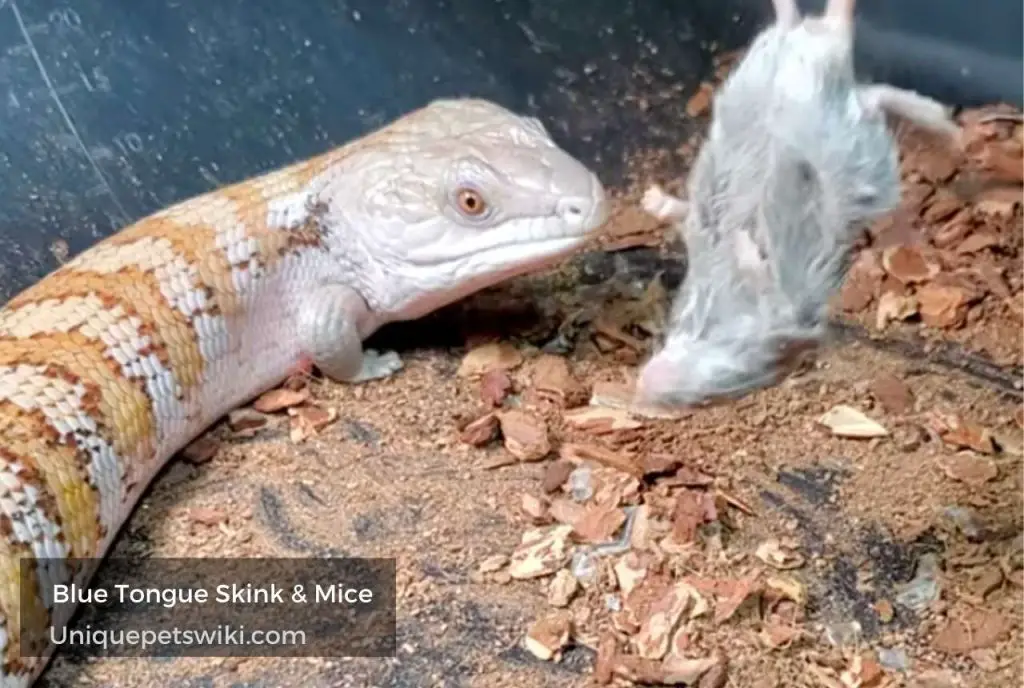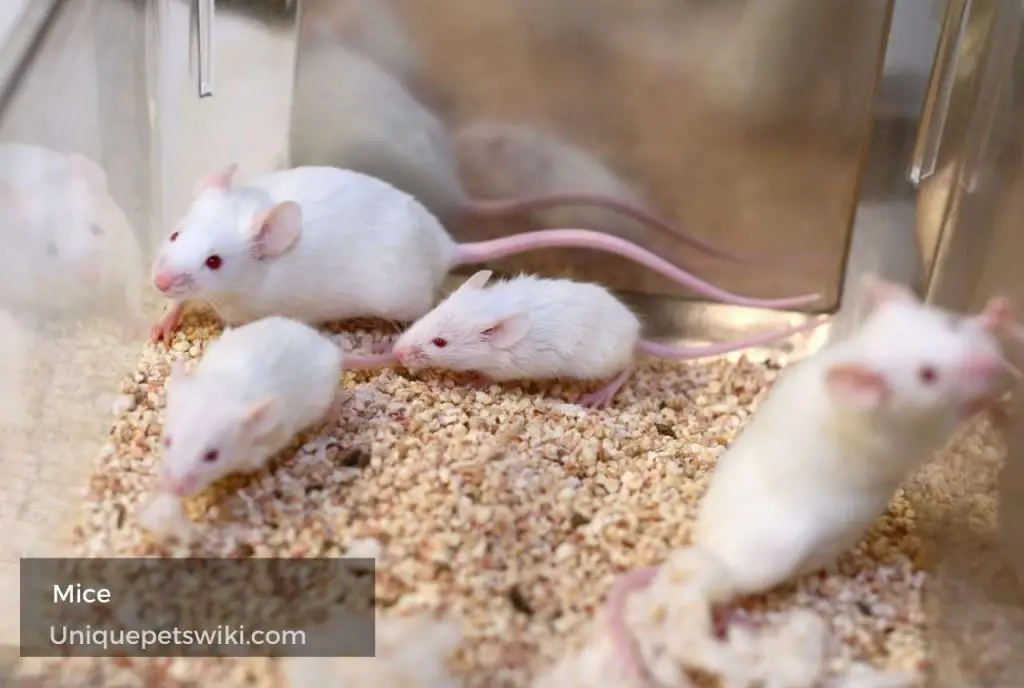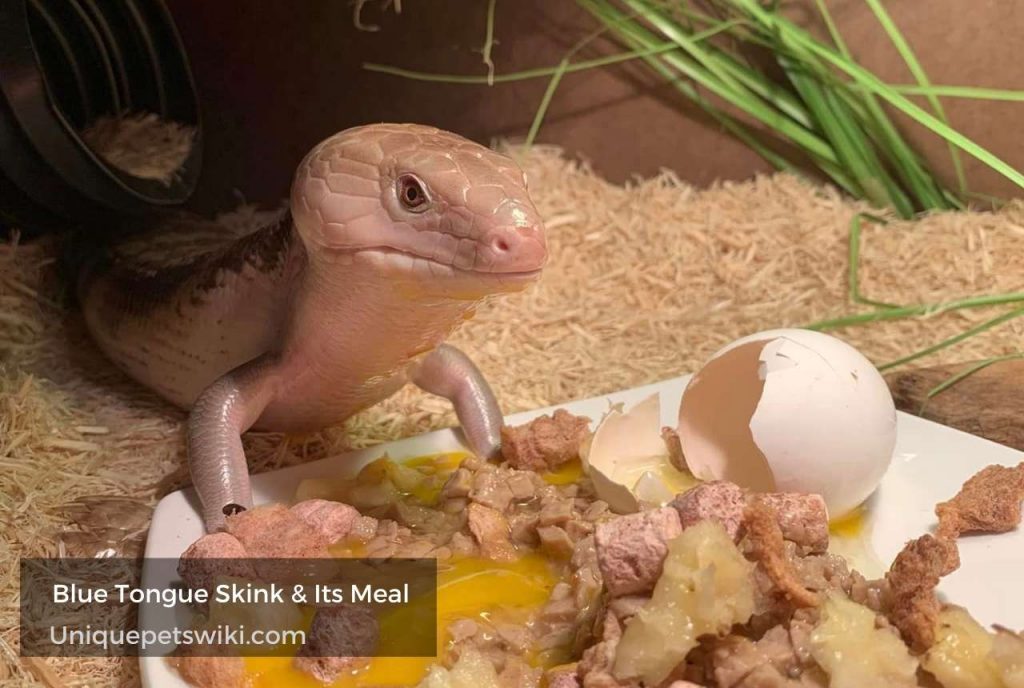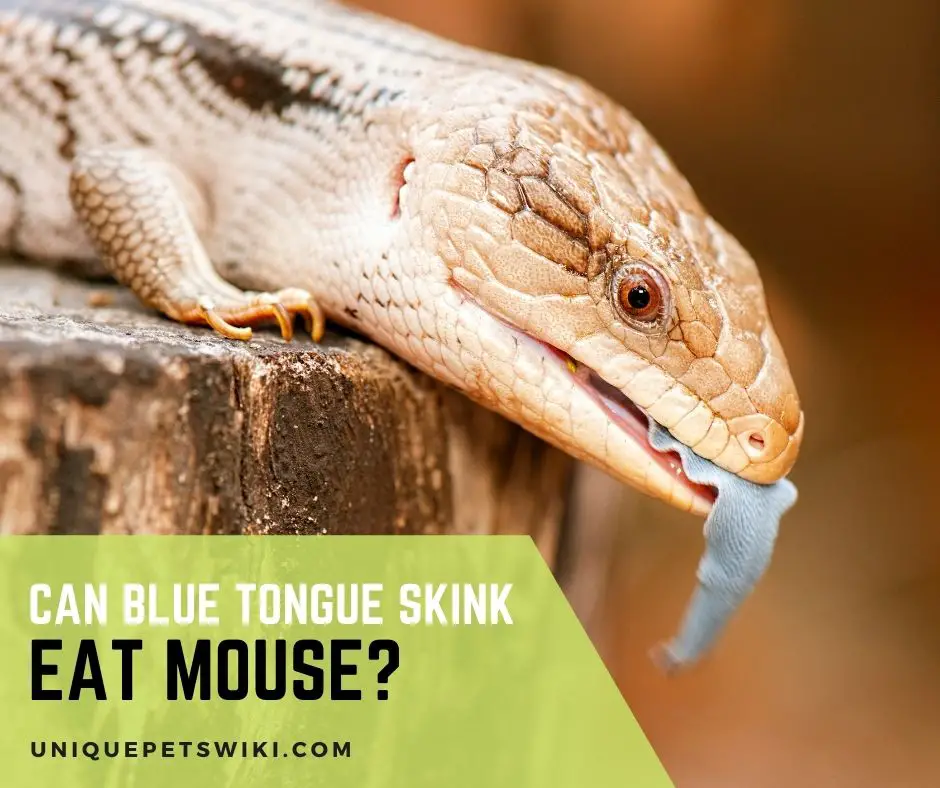Can a blue tongue skink eat mice? Yes, blue tongue skinks can eat mice as an occasional treat but vets recommend skink owners add a calcium boost to skinks’ diet if they are laying eggs or recovering from sickness.
It is important that you feed your pet the proper diet to keep it happy. However, before you can offer appropriate nutrition, you must first know their nutritional requirements.
One of the things that you may be wondering is whether your blue tongue skink can eat mice or if you should not feed them mice at all.
Blue tongue skinks are omnivorous animals, and you can feed them with both plants and animals.
In the wild, they feed on insects, fruits, vegetables, worms, flowers, and mice. Due to their varied diet, it makes feeding your blue tongue skink quite easy.
In this article, we will help answer your question of whether you can feed a blue tongue skink with a mice, the frequency, and how to go about this.
This article has been reviewed by Dr. Dilber. Read more about our knowledge control process here.
Contents
Can Blue Tongue Skink Eat Mice?

Yes, blue tongue skinks can eat pinky mice safely. This is because they are omnivorous reptiles, and mice can be a great addition to their diet.
However, mice have a high-fat level, and you should only feed them to your skink occasionally.
When Should You Feed Mice to Your Blue Tongue Skink?

It is recommended to feed only adult blue tongue skink with a baby or fuzzy mice. This is because a baby lizard may not chase or eat the mice.
Many hobbyists feed their skink with live mice to help develop their hunting instinct sharp and alive. However, some people offer frozen mice if they don’t want their skink to hunt.
It is best to use pinky mice only as an occasional treat for your blue tongue skinks.
You can also feed your blue tongue skink with pinky mice if your skink needs a calcium boost. Especially when your skink is just recovering from a sickness or just laid eggs.
Vet answer: It is not common that pet blue tongue skinks to hunt the mice. However, you can feed the skink mice and it is a good source of calcium. If you let your blue tongue skink to hunt a mice, it can get hurt. So, it is recommended to offer mice in the enclosure as an occasional treat.
How Many Mice Can A Blue Tongue Skink Eat?
You can feed your blue tongue skink with pinky mice. In the wild, they prefer to feed on insects but feed on mice occasionally when food is scarce.
This means it is best to feed your skinks with mice once or twice in a couple of months.
This is because they have high-fat content, and feeding them with mice can lead to health issues such as fatty liver disease and diarrhea.
Instructions to Prepare Mice as Food for Blue Tongue Skinks
In captivity, you don’t need to chop or cut the feeder mice into pieces before you feed your skink. You can feed them with live mice to help boost their hunting instinct and keep it sharp.
You can also use freeze-dried mice to feed your blue-tongued skinks. All you have to do is thaw the pinky mice, and you don’t have to chop or cut them into pieces.
Note: it is recommended to feed pinky mice to only adult lizards as baby skink will not be able to chase or ingest them.
You should only use live mice sourced from a reliable source and avoid using wildly caught mice when using live mice.
This is because wildly caught mice may have health issues or come in contact with harmful chemicals that can affect your lizard.
Many hobbyists prefer using freeze-dried mice to live ones to help prevent any health risks.
Extra Tip: Good and Toxic Foods for Blue Tongue Skinks

Blue tongue skinks are omnivorous creatures, and they need a varied diet to keep them happy and healthy.
Although they enjoy a variety of foods, some foods are good while some are bad for them. Some of the best and toxic foods for blue tongue skinks are stated below.
Best Foods for Blue Tongue Skinks
Cat food is recommended for young blue tongue skinks and dog food is for adult blue tongue skinks.
You will also need to provide 50% veggies and greens with 5-10% fruit. However, you will need to gut load the feeder insect when feeding them with a live bug.
You need to ensure everything your skink eats has a calcium to phosphorus ratio of 2 to 1. This will help to ensure that you are providing your skink with nutrients that they can absorb properly.
Some of the proteins you can give your blue tongue skinks are mealworms, super worms, canned super premium cat or dog food, canned insect products, boiled chicken, pinky mice, etc.
Some of the fruits and veggies suitable for your skink are collard greens, mustard greens, turnip greens, dandelions, squash, carrots, dandelions, mango, papaya, strawberries, etc.
Note: When using canned dog or cat foods, ensure that you feed your skink with only super-premium foods that do not contain meat/bone meal and by-products.
Zoo Med Food Crumbles for Blue Tongue Skink
- Carefully formulated by nutritionists to be a balanced diet to meet the nutritional needs of Blue tongue skinks for proper growth and development.
- Contains Chopped grasses (timothy, alfalfa) to provide long-stem fiber, An important part of their natural diet.
- Contains small amounts of fruit (mango) and animal protein (Black Soldier fly Larvae) to meet there unique dietary requirements.
- Contains flavorful dandelion greens, Yucca and other plants that Blue tongue skinks love.
- Can be mixed with zoo menu canned Blue tongue skink and Tegu Food and zoo Meds can O’ insect line to add variety to their diet.
Last update on 2022-12-29 / Affiliate links / Images from Amazon Product Advertising API
Toxic Foods for Blue Tongue Skinks
Although there are varieties of food that you can feed your blue tongue skinks from proteins to vegetables, some foods can be toxic to your pet.
Some of the food that is toxic to blue tongue skinks are:
- Avocado
- Eggplant
- Buttercup flowers
- Onion
- Hemp leaves
- Tulips
- Mushrooms
- potatoes
- Rhubarb
- Ham
- Oranges
- Pasta
- Peanut butter
- Pasta
- Parsley
Frequently Asked Questions (FAQs)
Can blue tongue skinks eat dog food?
Yes, blue tongue skinks can eat dog food. However, it is best to feed them with only canned food and avoid feeding them with dog food formulas with flavors, grains, artificial colors, and fish.
Can blue tongue skinks eat raw meat?
No, this is because raw meat such as turkey and chicken can be contaminated. It is best to feed your skinks with meat that is boiled and then freeze-dried.
Can blue tongue skinks eat hopper mice?
Yes, you can feed your blue tongue skinks with hopper mice. However, feeding skinks with hopper mice should be done occasionally as hopper mice have a lot of fat.
Can blue tongue skinks recognize their owners?
Yes, blue tongue skinks are personable creatures and can recognize their owners. They will become friendly and develop a bond with their owner as you tame and handle them.
- Unbreakable
- Cleans easily
- Realistic
- Material type: Cotton
- Unbreakable
Last update on 2022-12-29 / Affiliate links / Images from Amazon Product Advertising API
Conclusion
Blue tongue skinks can eat a variety of diets, and one of such is a mice. However, mice have high-fat content, and it is recommended that you feed your skinks with mice only as a treat.


